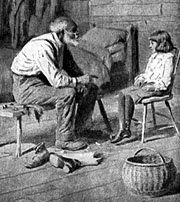 SEE HERE Delancey Place often has provocative pieces. You can sign up to get them mailed to you on a daily basis and you can tell if one is a "hit" by a quick look. This one focuses on the birth of philosophy, rational thought about the real world, not mythological fiction. I'd like to hurry to add that I'm a big fan of myth in the sense of story told to illustrate truth that can't be captured in any other way. That's what I think of as Tolkien's view of myth. But as a scientist I'm also very interested in things that can be shown to be true through data and principle.
SEE HERE Delancey Place often has provocative pieces. You can sign up to get them mailed to you on a daily basis and you can tell if one is a "hit" by a quick look. This one focuses on the birth of philosophy, rational thought about the real world, not mythological fiction. I'd like to hurry to add that I'm a big fan of myth in the sense of story told to illustrate truth that can't be captured in any other way. That's what I think of as Tolkien's view of myth. But as a scientist I'm also very interested in things that can be shown to be true through data and principle.
I'm currently reading Stanley L. Jaki's book "Chesterton, A Seer of Science." It's a short book. Jaki was both a Benedictine priest and Distinguished Professor of Physics at Seton Hall University, New Jersey where he taught from 1975. He died in 2009. I had the privilege to meet him a couple of years before he died at a Chesterton conference in Minnesota. I have a small library of Jaki's books which are all a joy to read. He had doctorates in both theology and physics and I have a copy of his physics thesis on Olber's Paradox. In this book "Chesterton, A Seer of Science" among other things, Jaki illustrates how Chesterton reacted to the scientism of his time.
"Scientism" is a particularly parochial view of science which imagines that the only truth is scientific truth. It is rampant in our day and had become rampant in Chesterton's time. The problem of course is that it isn't true. Chesterton pointed out in his own day how fast and loose with the truth scientists often were, using the patina of science to push views that were little more than an intellectual fashion in a narrow social society (rather like the liberal progressives of our day). In Orthodoxy for example, Jaki quotes Chesterton as saying: "Scientific phrases are used like scientific sheels and piston-rods to make swirfter and smoother yet the path of the comfortable." This is what we are seeing in the global warming discourse, bad science used as an argument to advance a political agenda. The point is that citing scientists is not the same as citing science, for scientists have views and all of their views are not scientific. Jaki points out something like what the media do:
Thus "some men say that Science says this or that; when they only mean scientists, and do not know or care which scientists." Particularly apalling in Chesterton's eyes was the ubiquitous invocation of Einstein's name. He saw in it a cultural curse to be resisted by the imposition of a small fine on anyone who after dropping Einstein's name "could not demonstrate before a committee of mathematicians and astronomers that he knew anything about Einstein."
The same kind of thing is going on constantly in our news media. The journalists cite science as if they (the journalists) actually knew any. Generally they don't. The only thing they know is which side they have picked to promote. Scientism is simply a false religion like all the other false religions. It is currently enslaved to the "Politics" false religion. This is particularly dangerous since it pretends that it is only doing the innocent thing of supporting the truth, when in fact it is manufacturing lies to please its master.









No comments:
Post a Comment